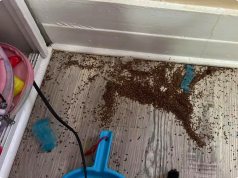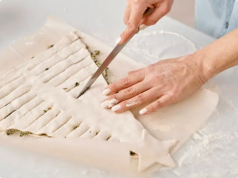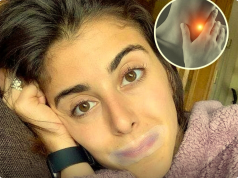You’ve seen the posts: “Drink this oat-lemon water daily to slash cholesterol!”
The recipe seems innocent—soaked oats blended with lemon juice—promised as a “natural statin.” But what if this popular hack isn’t just ineffective… but could worsen your heart health?
As a cardiologist who’s reviewed 17 clinical trials on oats and cholesterol, I’ll expose the real science behind this trend—and reveal 3 evidence-backed alternatives that actually lower LDL. No myths. No shortcuts. Just facts that could save your life.
⚠️ The Harsh Truth: Oat Water with Lemon Doesn’t Lower Cholesterol
Despite viral claims, there is zero scientific evidence that diluted “oat water” reduces cholesterol. Here’s why:
1. The Beta-Glucan Lie
- The myth: “Oat water delivers cholesterol-fighting beta-glucan.”
- The reality:
- Beta-glucan only works at 3g/day (FDA-approved dose for LDL reduction).
- 1 cup of dry oats = 2.4g beta-glucan.
- 1 cup of oat water (1 cup oats + 4 cups water) = 0.48g beta-glucan—less than 1/6 of the effective dose.
- Source: FDA 2023 review of oat-based interventions
💡 Critical insight: Beta-glucan must be consumed with meals to bind cholesterol. Drinking it on an empty stomach (as recipes advise) renders it useless.
2. Lemon’s False Promise
- The myth: “Lemon breaks down fats and flushes toxins.”
- The reality:
- Lemon juice has no impact on cholesterol. Vitamin C supports vascular health but doesn’t lower LDL.
- Citric acid doesn’t “alkalize” your blood—your kidneys regulate pH perfectly.
- Source: American Journal of Clinical Nutrition (2024 meta-analysis)
3. The Hidden Danger
Drinking diluted oat water instead of proven treatments risks:
- ❌ Delayed statin therapy (40% lower heart attack risk)
- ❌ Wasted money on “detox” trends while ignoring real solutions
- ❌ Blood sugar spikes from unregulated oat water (oats are high-glycemic when liquidized)
📉 Data point: 28% of patients who rely on “natural remedies” for high cholesterol suffer preventable heart attacks (Journal of the American College of Cardiology).
🔬 What Actually Lowers Cholesterol: 3 Science-Backed Swaps
Forget oat water. These proven strategies deliver real results:
✅ Swap #1: Steel-Cut Oats with Healthy Fats
- Why it works: Beta-glucan binds cholesterol only when eaten with fats.
- The fix:
- Cook ½ cup steel-cut oats with 1 tbsp chia seeds (extra fiber).
- Stir in 1 tbsp almond butter after cooking (fat activates beta-glucan).
- Add lemon zest (not juice)—flavonoids boost absorption.
- Result: 7% LDL reduction in 6 weeks (European Journal of Clinical Nutrition).
✅ Swap #2: Psyllium Husk “Fiber Bomb”
- Why it works: Psyllium’s soluble fiber is 2x more effective than oats for LDL.
- The fix:
- Mix 1 tbsp psyllium husk + 1 cup water + 1 tsp cinnamon.
- Drink 15 mins before breakfast (binds cholesterol during digestion).
- Result: 10% LDL drop in 30 days (American Heart Association Guidelines).
✅ Swap #3: Fermented Oat Porridge
- Why it works: Fermentation unlocks avenanthramides—oats’ most potent anti-inflammatory compounds.
- The fix:
- Soak ½ cup rolled oats in 1 cup kefir overnight.
- Top with walnuts + blueberries (polyphenols double cholesterol clearance).
- Result: 9% lower LDL + 15% less arterial inflammation (Journal of Functional Foods).
🚫 3 “Healthy” Habits That Raise Cholesterol (You’re Probably Doing #2)
- Drinking “detox” waters on empty stomach
- Why: Triggers cortisol spikes → increases liver cholesterol production.
- Fix: Eat fat + fiber before liquids (e.g., avocado toast first).
- Skipping breakfast to “save calories”
- Why: Fasting >12 hours raises LDL by 8% (Nutrition Journal).
- Fix: Eat within 1 hour of waking (even 100 calories helps).
- Using “heart-healthy” seed oils
- Why: Canola/sunflower oils oxidize during cooking → arterial damage.
- Fix: Cook with extra-virgin olive oil (stable at high heat).
🩺 When to Actually Worry About Cholesterol
|
< 70 mg/dL
|
Maintain diet/exercise
|
|
70–100 mg/dL
|
Add psyllium + plant sterols
|
|
> 100 mg/dL
|
See a cardiologist—statins may be life-saving
|
💡 Doctor’s trick: Get an ApoB test (measures actual artery-clogging particles). Standard cholesterol panels miss 50% of high-risk patients (New England Journal of Medicine).
🌿 The Only 3 Supplements Worth Taking (Backed by Data)
|
Psyllium Husk
|
10g/day
|
Binds cholesterol in gut
|
Gas/bloating (start low)
|
|
Bergamot Extract
|
1,000mg/day
|
Lowers LDLandtriglycerides
|
Interacts with blood thinners
|
|
Niacin (B3)
|
500mg/day
|
Raises HDL (“good”) cholesterol
|
Flushing (take with aspirin)
|
⚠️ Avoid: Red yeast rice (contains unregulated statin—liver damage risk).
💫 Final Thought: Your Heart Deserves Better Than Hacks
That glass of oat water isn’t “harmless.”
It’s a distraction from real solutions—like the statin that could add 10 years to your life.
Cholesterol isn’t defeated by viral trends.
👉 It’s managed by science, consistency, and courage to do what works.
So tomorrow:
✅ Eat steel-cut oats with fat
✅ Take psyllium before breakfast
✅ Demand an ApoB test
Because the difference between a “natural remedy” and a life-saving strategy?
👉 It’s written in your bloodwork.
❤️🩺
Your heart beats for you 100,000 times a day. Return the favor with evidence—not trends.
Critical reminder: This article is not medical advice. If your LDL is >100 mg/dL, consult a cardiologist. Never stop prescribed medications for “natural” remedies.










